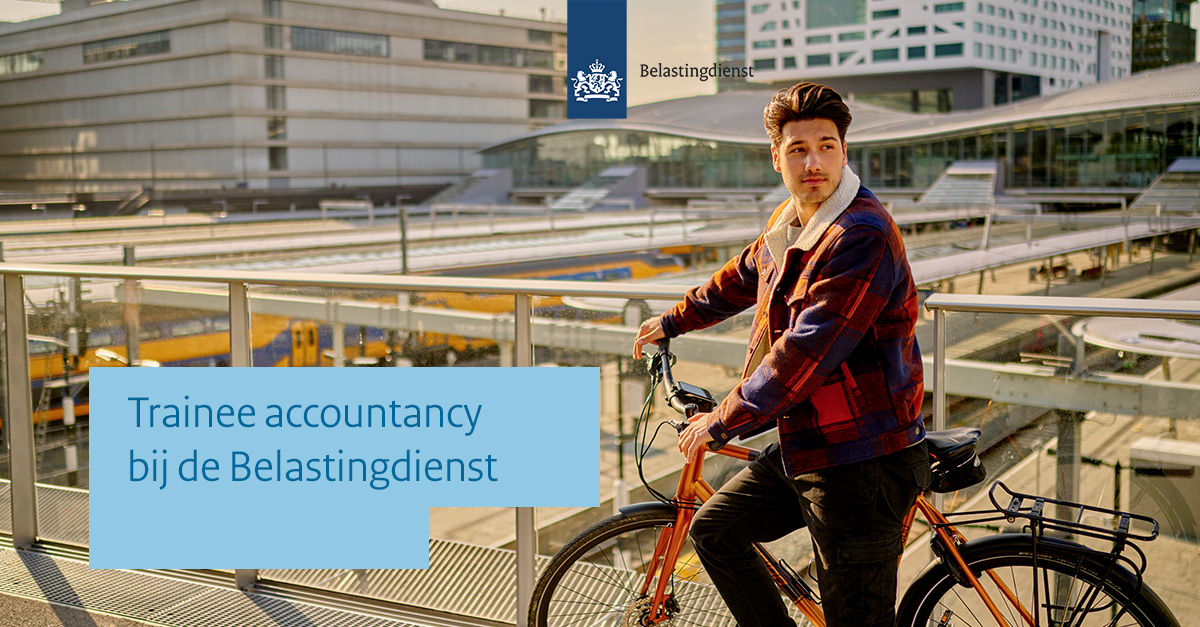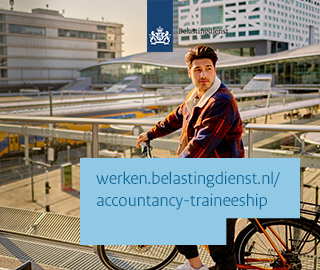For the Dutch version, click here
The standard accountancy track is well known to many accountancy students: you follow a (business) economics bachelor, continue your studies with a master accountancy and then transfer to an accountancy firm where you start at the same time as the post-master. A long process with the aim of obtaining your RA title. However, Jesse Mol and Zaid Kwetir chose a different path. They follow the Trainee accountancy trajectory at the Dutch Tax and Customs Administration. The Trainee accountancy trajectory (previously called dual training accountancy) concerns a training to become a registered accountant with which you combine both accountancy and tax in order to audit tax returns. Another line of work, but not less important. What is it like to be trained as a chartered accountant at the Dutch Tax and Customs Administration? Jesse and Zaid tell us about this in the interview below.
Could you tell us a bit about yourself and how you ended up at the Dutch Tax and Customs Administration?
Jesse: My name is Jesse, 26 years old, and I’m originally from a village just outside Amsterdam. After completing my bachelor’s degree in Economics and Business Economics, I decided to travel and work in Spain for a year. After this enjoyable year, I started working in the payroll administration in combination with a traineeship. I liked the idea of a traineeship. However, the payroll administration did not interest me. I did find the payroll tax part of the payroll administration interesting. Then there was the vacancy for the Tax and Customs Administration; a work-learning trajectory at master’s level where I could delve more into the tax world. I finally started the Trainee accountancy trajectory here in 2019.
Zaid: I am Zaid, 31 years old, and a few years ago I graduated from the Business Economics course at the Hogeschool van Amsterdam. After working for half a year as an assistant controller at a pharmaceutical company, I felt the urge to continue my studies. That is why I started with the master Accounting and Control at the University of Amsterdam. After this study I started as an assistant controller in education. I liked the accounting part, but I missed something, namely the tax aspect. Out of curiosity to learn more about the tax world, I applied for a job at the Dutch Tax and Customs Administration. This was the perfect way for me to combine my foundation in accountancy with tax law. I started here in August 2020.
How is the Trainee accountancy trajectory structured?
Jesse: The training consists of two parts. You do not work yet during your first six months at the Dutch Tax and Customs Administration. Instead, you follow an internal study path through the Tax and Customs Administration’ academy to learn the basis of tax. The lessons of the Tax and Customs Administration Academy can take place both online and in person. You start your studies at the university at the same time as you start working for the Dutch Tax and Customs Administration. You will thus follow two studies, one of the Tax and Customs Administration Academy and the university program to become a registered accountant. The latter is the regular route that you would also follow if you were to work at an accountancy firm. The distinction is therefore made by the internal tax training.
What exactly does your position entail and how does this differ from audit work?
Jesse: After you have acquired a sufficient tax base in your first six months of study at the Tax and Customs Administration Academy, you will start with your first assignment. Within the Tax and Customs Administration, you will get some sort of standard customer package. For example, almost everyone starts with an SME customer and you will also participate in some individual assignments for personal income taxes. However, the focus is mainly on the control of company declarations. After collaborating with an SME client, you will proceed to audit large companies.
Zaid: What mainly distinguishes our work from an annual financial statement audit is the audit object, namely the tax return. When auditing this, the standard audit procedures of an accountant apply. Focus points within the audit of a tax return are on internal control, corporate income tax, sales tax and payroll tax. If it concerns a large company, we often also request the accountant’s report to determine whether we can rely on this. In terms of day-to-day work, it is common, just like at accountancy firms, to work for the customer. In normal, non-Covid-19 times you are on the road a lot and you can get a glance of what is happening behind the scenes at many companies.
What is the balance between the tax aspect and the accountancy aspect?
Zaid: Obviously the focus is on the tax aspect, as the audit object is the tax return. In summary, you could see as follows: we use the techniques of auditing, while having to apply the tax rules in our work.
Work pressure is a theme that often recurs within the accountancy sector. How do you experience the workload and the combination between studying and working?
Zaid: I believe that your experience of work pressure depends to a large extent on the enjoyment of your work and your interest in both tax and accountancy. “Personally, I like working and studying. As a result, the combination of work-learning works well for me.” Of course, there is some work pressure at the Tax and Customs Administration. A certain time is provided for each declaration, after which the audit must be completed. The difference with regular accountancy firms is that the deadlines vary more. This depends entirely on the year in which the tax return was submitted by the taxpayer. Furthermore, we work with samples, which means that we do not audit every tax return. All in all, the workload is well spread, so there are no extremely busy periods.
Jesse: The work-life balance was a factor that played a role in my choice for the Tax and Customs Administration. After all, the Tax and Customs Administration is known to have a lower workload compared to accountancy firms. After 1.5 years of employment with the Tax and Customs Administration, I can confirm this. There is much attention for your studies, and you are given enough space to make time for this. In addition to this flexibility, there is also a lot of support. For example, when I need help with my studies, it is easy to arrange an afternoon with my supervisor. This makes the combination of work and study balanced. In the beginning, the combination between study and work was equally difficult, especially in my pre-master’s. Sometimes I wonder how people manage to follow this trajectory at an accountancy firm. Working 40 hours in addition to my studies seems really tough to me.
How do you experience the guidance within the Tax and Customs Administration?
Jesse: In the first few years, the supervision was fairly extensive and well organized. On the one hand, we have a team leader. This person mainly supports the study trajectory and ensures that the learning process runs smoothly. On the other hand, there is a work supervisor who supports you during customer assignments, but who changes per period. Every morning we kick off the day with our work supervisor to discuss the planning. You also have a personal mentor. He or she supports you in all areas, so both in the work and learning process. In short, there is no shortage of guidance.
What do you like most about working for the Tax and Customs Administration?
Zaid: What I enjoy most about my job is the challenge of combining two parts of my education. On the one hand, you perform auditing activities. On the other hand, you must keep the tax rules in mind and apply them in your audit work.
“Puzzling complex cases makes the work challenging and fun.”
Jesse: I recognize that challenge at work. For example, I recently came across a complex issue about a fiscal entity and sales tax. You really have to dive into the law and jurisprudence for these kinds of issues. In the end, I prepared the case myself and contacted a specialist to find a solution. Puzzling with complex cases makes the work challenging and fun. I also get a lot of satisfaction from customer contact. To illustrate, you quickly start with introductory customer conversations and you have a lot of customer contact during the audit.
Are there specialization opportunities within the Tax and Customs Administration? If so, do you have a particular specialization in mind?
Jesse: Actually, the Tax and Customs Administration is such a huge organization that you can go in any direction you want. After you have obtained the RA title, you can, for example, specialize in sales tax or payroll tax. You can also choose to grow in the long term in other directions, such as Customs[1], IT audit or the Fiscal Information and Investigation Service (FIOD).
Zaid: My main wish now is to get my RA title. After all, it is a long journey. By then, I will see what happens.
Jesse: During my studies at Nyenrode, I took a Data Analysis course. This course, and actually everything that has to do with software, interests me. A specialization in IT audit would therefore be my preference at the moment.
Do you have any tips for students?
Jesse: What characterizes working at the Tax and Customs Administration is that you have to be able to work very independently. If you like independence, then working at the Tax and Customs Administration is definitely recommended. You quickly get a lot of responsibilities, such as an introductory meeting with the customer. In the beginning, this may be challenging of course, as you are completely thrown into the deep end. However, you learn a lot from this.
Zaid: I completely agree with this. You quickly get issues that are completely new to you and, at first sight, complex. You get the opportunity to play around with this yourself. In short, if you like independence, complex issues and taxation, then working at the Dutch Tax and Customs Administration might be a very good fit for you.

















